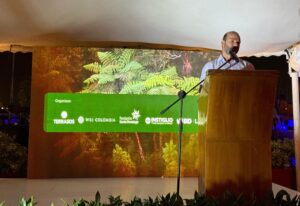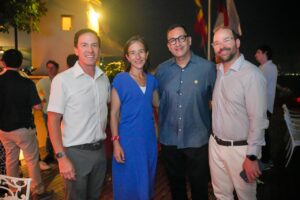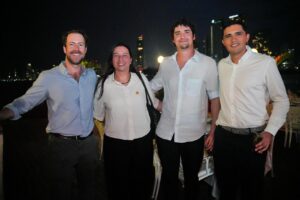At the 10th ANDI Colombian Business Congress, business leaders, investors, and civil society representatives met to discuss financial solutions to protect biodiversity and the country’s economic future.
In a dialogue convened by WRI Colombia, Terrasos, Fundación Santo Domingo, and Instiglio, with support from IDB Lab, the private sector explored concrete pathways to position Colombia as a leader in sustainable finance.

Cartagena, August 2025. At a decisive moment for Colombia’s environment and economy, business leaders gathered on August 13 during the 10th ANDI Colombian Business Congress to discuss how to safeguard the country’s natural wealth through innovative biodiversity financing.
Participants agreed on the urgency of building a long-term vision for Colombia in which biodiversity is not treated as an environmental externality but as strategic infrastructure underpinning national competitiveness. The discussion focused on how to mobilize investment to secure operational resilience, access to sustainable markets, and stability across value chains, through nature-based solutions.
Organized by WRI Colombia, Terrasos, Fundación Santo Domingo, and Instiglio, with support from IDB Lab and backing from ANDI’s National Water and Biodiversity Center, the conversation centered on innovative mechanisms to finance biodiversity, including results-based financing, biodiversity units, impact investment, and conservation contracts.

The dialogue advances coordinated private-sector action to protect biodiversity and position Colombia as a global laboratory for innovative conservation finance. A select group of CEOs, impact investors, and sustainability decision-makers exchanged views and expectations on biodiversity-finance models that have already generated economic value in other countries while restoring ecosystems.
Latin America, home to 40% of the world’s biodiversity, faces weak regulatory frameworks and fragmented efforts that have not halted the crisis. To reverse this trend, Target 19 of the Global Biodiversity Framework estimates that USD 200 billion will be needed annually through 2030.

Fernando Páez, Executive Director of WRI Colombia, underscored the private sector’s pivotal role: “We met to catalyze investments that integrate nature protection with social and economic progress, recognizing that conserving biodiversity and its ecosystem services is essential for community well-being and the country’s resilience.” He added: “With this meeting, we aim to drive financing mechanisms that deliver tangible results in preserving the ecosystems that sustain our future.”
Daniel Gonzales, Director of Social Investment at Fundación Santo Domingo, highlighted how private capital can power the global biodiversity agenda: “We face a historic opportunity to align profitability with regeneration. Colombia is at a tipping point where it can become a global reference for how biodiversity is financed and protected. By linking financing to measurable results, we increase the effectiveness of investments and build the trust needed to mobilize resources at scale.”

Bringing a business perspective, Mariana Sarmiento, CEO of Terrasos, illustrated, through concrete cases, how to treat ecosystems as strategic assets: “The future of our ecological infrastructure –the living systems our survival depends on- will be determined by how we turn commitments into concrete action through innovative models like Habitat Banks. For decades, we have invested in gray infrastructure: bridges, roads, and networks that connect and sustain our economies. Today, we must apply the same vision to green infrastructure, recognizing the immense value of the services biodiversity provides: clean water, pollination, climate regulation, and resilience.”
The discussion addressed three priority areas: (i) investment experiences in biodiversity, such as environmental offset programs and community partnerships; (ii) barriers, including the lack of common metrics and fragmented policies; and (iii) solutions, among them public–private financial instruments and clear standards to reduce investor risk. This exercise captured the private sector’s voice, highlighting both the opportunities and the concrete challenges to scaling biodiversity investment from the core business.

Sergio Rengifo, Executive Director of CECODES, noted: “Companies already do a great deal on sustainability. We need to simplify the language around nature and share success stories so industries can better understand their dependencies on nature and move forward with confidence and at scale.”
Lina María Mondragón, Vice President of Strategy and Sustainability at Corficolombiana, emphasized: “We are working to ensure the sustainability agenda increasingly serves the Corporation’s risk management and that of our portfolio companies. One way to move this agenda forward, and to strengthen our ties with both nature and local communities, is by taking concrete actions that reveal opportunities to make our activities and infrastructure more resilient through nature-based solutions, while at the same time conserving and protecting the ecosystems that surround us.”
On the same line, Alejandra Robledo, Shared Value Manager at Constructora Bolívar, added: “Companies are committed, but we need clear, finance-team-friendly business models that demonstrate how investing in biodiversity reduces risk and improves operational stability.”

Closing the event, Sebastián Chaskel, Partner at Instiglio, echoed participants’ central message: the urgency to “recognize that nature and biodiversity unite us as a country, and that safeguarding these resources, on which we depend, requires us to come together to invest in our future,” stressing that results-based financing can align private capital with real environmental impacts, ensuring every peso invested generates tangible benefits for companies, communities, and ecosystems.
This gathering marked a key milestone in demonstrating through evidence and real cases that investing in biodiversity is both strategic and profitable for the private sector. For the organizers, the next step is to develop a roadmap that advances nature-based financial solutions, strengthens governance, mobilizes capital, and positions Colombia as a benchmark for integrating biodiversity into economic development.
